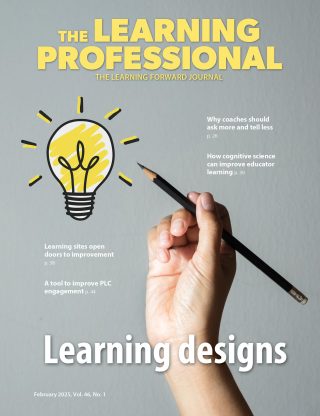FOCUS
Strong teams, strong results
Formative assessment helps teacher teams strengthen equity
By Michelle Crowell and Nancy Love
October 2018
Vol. 39 No. 5
Read the remaining content with membership access. Join or log in below to continue.
Sed ut perspiciatis unde omnis iste natus error sit voluptatem accusantium doloremque laudantium, totam rem aperiam, eaque ipsa quae ab illo inventore veritatis et quasi architecto beatae vitae dicta sunt explicabo. Nemo enim ipsam voluptatem quia voluptas sit aspernatur aut odit aut fugit, sed quia consequuntur magni dolores eos qui ratione voluptatem sequi nesciunt. Neque porro quisquam est, qui dolorem ipsum quia dolor sit amet, consectetur, adipisci velit, sed quia non numquam eius modi tempora incidunt ut labore et dolore magnam aliquam quaerat voluptatem.
References
Black, P. & Wiliam, D. (2009). Developing the theory of formative assessment. Educational Assessment, Evaluation, and Accountability, 21(1), 5-31.
Cohen, G.L. & Steele, C.M. (2002). A barrier of mistrust: How stereotypes affect cross-race mentoring. In J. Aronson (Ed.). Improving academic achievement: Impact of psychological factors on education (pp. 305-327). Oxford, England: Academic Press.
Hammond, Z. (2015). Culturally responsive teaching & the brain: Promoting authentic engagement and rigor among culturally and linguistically diverse students. Thousand Oaks, CA: Corwin Press.
Hattie, J. (2017, December). 250+ influences on student achievement. Available at www.visiblelearningplus.com.
Hattie, J. (2012). Visible learning for teachers: Maximizing the impact on learning. New York, NY: Routledge.
Love, N., Stiles, K.E., Mundry, S., & DiRanna, K. (2008). The data coach’s guide to improving learning for all students. Thousand Oaks, CA: Corwin Press.
Popham, J. (2017). Classroom assessment: What teachers need to know (8th ed.). Boston, MA: Pearson.
Saphier, J., Haley-Speca, M., & Gower, R. (2018). The skillful teacher: The comprehensive resource for improving teaching and learning (7th ed., p. 410). Acton, MA: Research for Better Teaching.
Recent Issues
BUILDING BRIDGES
December 2024
Students benefit when educators bridge the continuum of professional...
CURRICULUM-BASED PROFESSIONAL LEARNING
October 2024
High-quality curriculum requires skilled educators to put it into...
LEARNING TO PIVOT
August 2024
Sometimes new information and situations call for major change. This issue...
GLOBAL PERSPECTIVES
June 2024
What does professional learning look like around the world? This issue...












